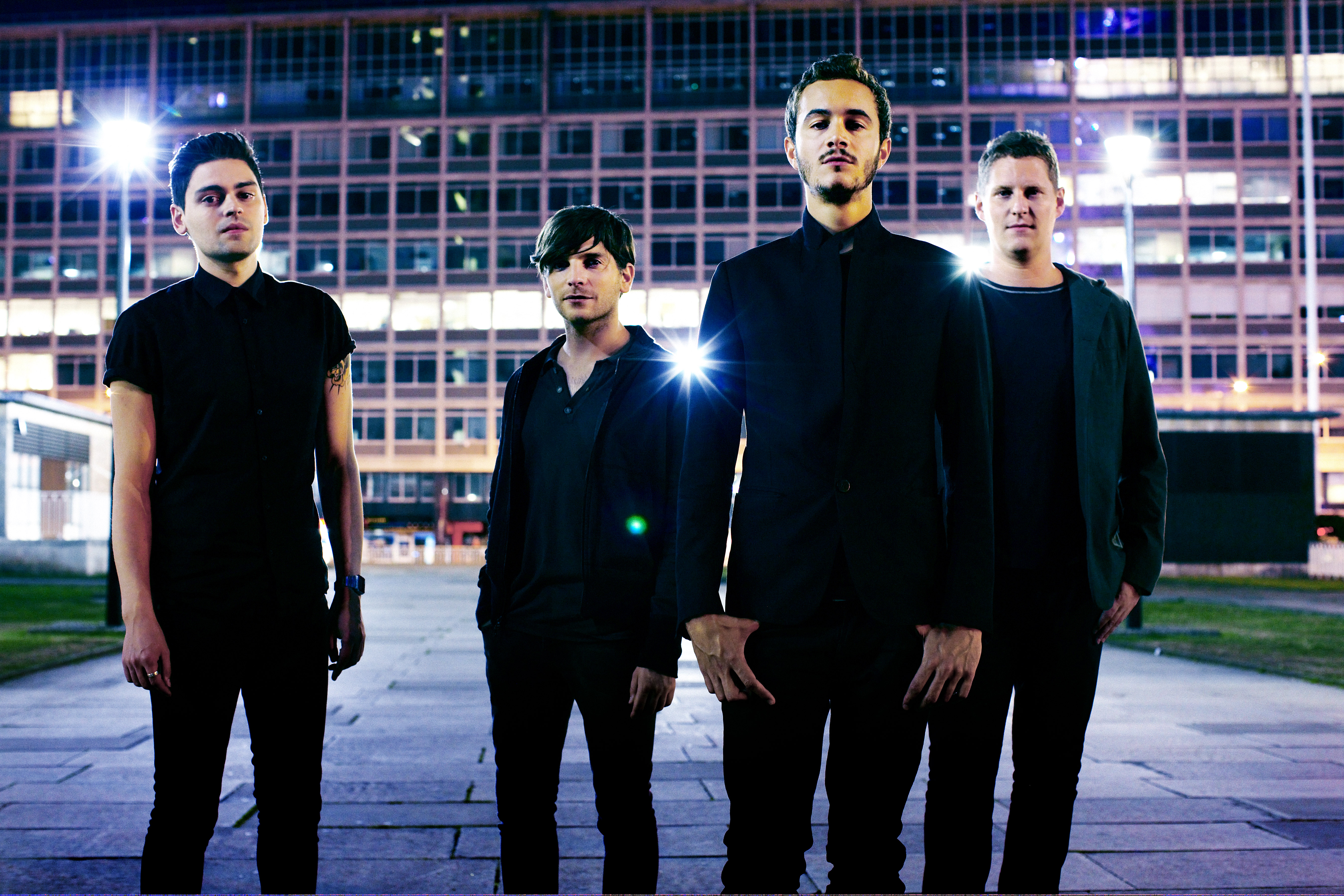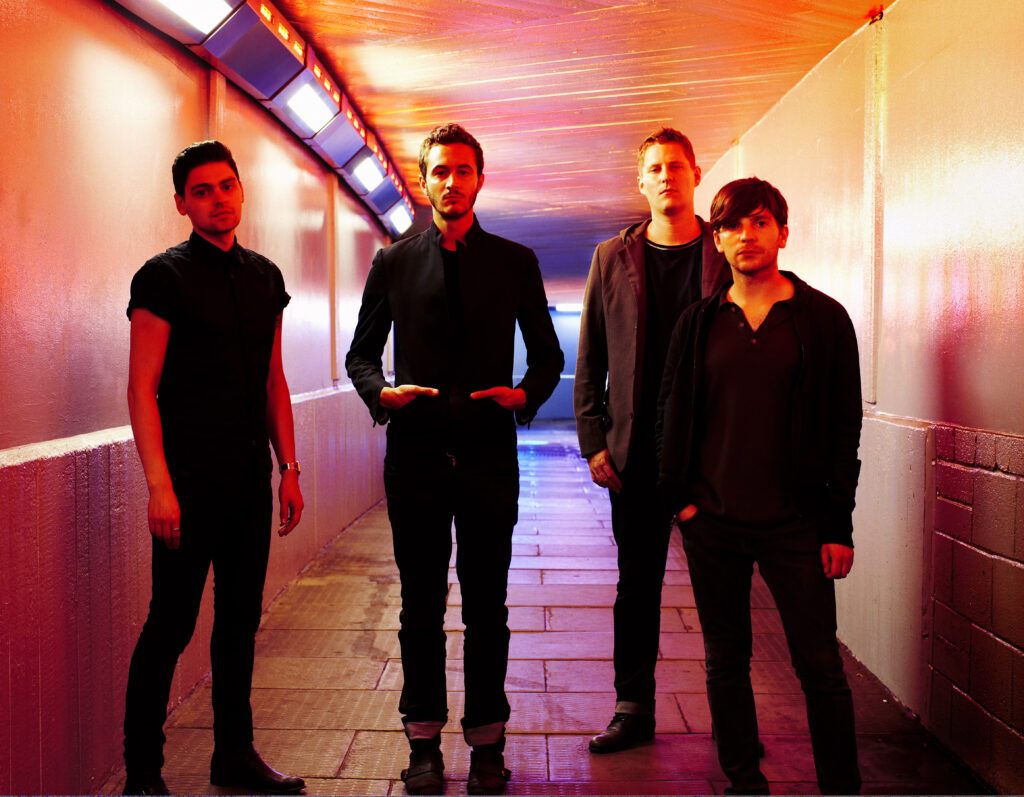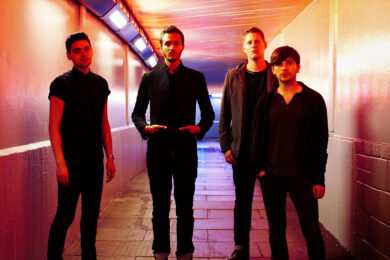Bittersweet October. That mellow, messy, leaf-kicking pause between the opposing miseries of summer and winter. In keeping with the seasonal chill come Editors, them of the doom-soaked post-punk elegies, arresting baritone and defiantly unGoogleable moniker – returning to strafe the tenements of indieville with blasts of portentous strop pop and snatch back their noir-rock crown from the spindly mitts of White Lies with a damn-you-sir! look in their eyes. Armed with new record In This Light And On This Evening, the sound of Editors 2k9 is one that slips past the darkest corners of The Back Room, through the enormodome-baiting crunch of sophomore effort An End Has A Start before stumbling with red-eye and garret pallor into the light of a pleasingly synth-stained death disco stomp. Favouring evolution over revolution, the latest clutch of songs welds Editors’ trademark franticisms to New Order’s Power, Corruption And Lies and Kraftwerk’s career-highlight reel to craft a goose-steppin’ doom jitter aimed at the tear-stained wallflowers as much as the dancefloor legion.
We find the band suiting up for gameday at Sony HQ, readying themselves for a two month European tour and knee-deep in press and promo. Propping frontman Tom Smith in a quiet corner and brandishing inquisitions, it quickly becomes clear that the interview treadmill has already begun to grind him down a tad. Polite but always to the point, his voice is undeniably flecked with the grim determination of someone who has been forced to stare down the barrel of one too many Dictaphones recently. Veering from rapidfire effusiveness to a broken and stilted staccato, Smith comes across as a polite and affable enough fella, but one who seems to take care not to give away too much. Whenever he starts to loosen up it is like a light goes off in the back of his head that reminds him to rein it back in, flipping from yeah-mate-yeah candour one minute to the nervous hesitance of a cat that’s just come back from the vets the next, often within the space of the same sentence. A combination of assertion and uncertainty, the man is a curiously precise encapsulation of his band’s music.
Hello Tom, how’s every little thing?
TS: I’m good (sighs). OK, busybusybusy…
You sound tense. Bored with all the press duties yet?
TS: I’m bored with the press before we’ve even started, mate. It’s always busy before we go on tour… technically when we’re on tour we’re even more busy than where we are now but because every day is totally different, I don’t know it’s a bit more… um, it’s a bit less… this period just feels more tiring, definitely. [quickly] But I’m not moaning, if people didn’t want to talk to us, we’d be in trouble.
You’re back after a 12 month break following An End Has A Start with a new album. How did you spend the downtime? Did becoming a father change the way you approached writing this album?
TS: Um… in the uh, ‘downtime’ I did become a father, yes… (laughs). But I was always writing, and while I had other things going on in my life they could run alongside each other. In my downtime at home I was just writing songs and those songs eventually became the early demos for this record so… we took our time on them and being a dad and a songwriter were both big parts of my life during that time, but I don’t know.
I think with hindsight it’s easier to look back and pinpoint with better detail how you’ve changed compared to a certain point… like looking back on making the second record I can look back and see how hard it was but also see the flaws and the positives in it and so it feels hard when you are very close to something to say exactly how it changed you, but of course there is change… you have to be less selfish, don’t you? The way of the world does slightly change, you have to be more aware of things around you so I’d say it has filtered into a couple of songs on the new record. But I did try very specifically not to write about being a dad – I didn’t want to approach it in that detail, but it does affect your outlook.
You recently spoken about how tired you are with people endlessly asking why your music is so ‘dark’…
TS: That’s just the world we like to explore musically… it’s what we like to do and people just interpret that as dark. I mean, it is darker than most pop music and mainstream music too and in terms of writing lyrics or music we get drawn to things that are nasty or unsettling or creepy. We get a buzz out of that. It’s the way we like to express ourselves and I think then certain sections of the media or certain people will turn their nose up at ourselves because they think we take it, and ourselves, too seriously. I don’t understand that and I don’t see why there’s a problem there but hey, that’s fine. You can’t please everyone with what you do and we can’t see an alternative. And I do get tired of people asking “why? why?” because away from the band we do seem more normal people and so they don’t believe us… they question our integrity for it and that concept is just wrong. I’m confused by it so… yes, I do tire of those kind of questions. Yes.
The new album has a definite shift away from guitars to synths, keyboards and a more electronic sound. Was that something you spearheaded or was it a group decision?
TS: It was kind of a group decision… we wrote a new song called ‘No Sound But the Wind’ and we played it at a few festivals and a few shows over last summer and it was bit more traditional, Editors-sounding song.. like, Chris on guitar and all the usual and it was… ‘fine’, y’know? The song was OK. It was good. But it felt like over the last few years there is a groove we fell into and there are things we all do very naturally, be it a certain rhythm or certain way the bass sounds and it just felt like we were falling into that trap again, where it was almost a formula. And that’s not what it’s about. That was fucking terrifying. It was a good song but we weren’t excited by the process of making it.
So after we finished touring, Chris stopped writing on guitars and started on synths while a lot of my early demos also had a lot of synth on them and we found it gave our songs a different atmosphere and a different feeling so very early on we felt like the songs were going in a different direction and suddenly it was exciting again as we explored new territory. I mean, true originality in music is very hard, if nigh on impossible, to achieve. But when we are doing what we’re doing, we feel like The Beatles, y’know? It’s an amazing feeling. And we are excited again.
At the risk of sounding like a pretentious prick, we are artists and we want to push ourselves. Looking back at my favourite bands, I like it when they would test me and surprise me. I might not have liked it straight away but I like people like REM and Radiohead who refuse to play it safe. Bands who take turns you wouldn’t expect and challenge their audience. Bands should do that. People see that we’ve moved away from a guitar-based sound and say, ‘Oh, I don’t like that’, but where’s the fun in just sticking to what you know.
Elements of the new album are perhaps your most abrasive and dissonant to date while some tracks, like ‘Papillon’ and ‘Eat Raw Meat = Blood Drool’ are some of your most Pop moments – did you consciously decide to push both those aspects on In This Light And On This Evening?
TS: We definitely decide to do new things with every new song and when it came to the record there are songs that are slightly different from each other and there is connection between the songs, they fit together but I don’t think there is any song that sounds directly like the one that preceded it. Which I think is a good thing – we strive to find a new way of making an Editors song each time so yes, I suppose. Absolutely.
However, we don’t think of it in a commercial sense really. We have an understanding of it but we don’t work according to that. We like it have pop moments like ‘Raw Meat’ but we equally also like it to have moments like ‘Walk The Fleet Road’ or ‘The Big Exit’. I mean, my favourite bit of the album is where it drops out of ‘The Big Exit’ and into ‘The Boxer’. It’s darkest, bleakest and most creepy section of the album and that is the best moment on a record that we’ve ever come up with. People will have a different opinion on it, fine. But it’s like… we always liked Depeche Mode. We always liked the singles. But over the last couple of years I’ve definitely got to know their album Violator more and I never really appreciated one of their albums as a whole. Of course on that album there are two amazing singles from a commercial standpoint but what struck me about the record was that the atmosphere was sustained throughout the whole piece and, from start to finish, the album takes you on a journey. Great records normally have a bit of both. It is possible to have great albums without great singles… I can’t really think of one, umm…. OK Computer? Is there a great single on there? I don’t know. ‘Paranoid Android’ is good – but it’s a little long compared to the average single.

Perhaps. I noticed In This Light And On This Evening was up on Spotify almost three weeks before it’s due out – even about a week before it leaked…
TS: How do I feel about that? I don’t know. It opens up a whole sea of questions about the modern world and how quickly we are getting into of the dumbing down of music and filesharing before we know it, but… (laughs). I’m not a user of Spotify and I don’t really understand it… it’s just the modern world we live in. Hopefully it can be a tool to give people the chance to hear our music and then go out an buy it and appreciate it as a whole. I don’t feel that I can offer any real solutions to the topic but I have my opinion on it. How do I feel about it? I don’t know. I can’t understand where all the money in Spotify goes…
Having worked on an album for over a year and seen it through every stage, do you think an album is somehow artistically compromised as a ‘distinct entity’ when it’s just uploaded onto Spotify/We7/whatever’s labyrinthine digital jukebox right away?
TS: Yeah, there’s an element of that I can identify with, definitely. The way people consume music these days has changed and the idea of listening to an album from start to finish is a redundant concept almost to the majority of the music-buying public. It’s fucking terrifying. The idea of investing time in a band that you love and looking forward to hearing their next album is disappearing rapidly. People buy individual tracks, steal them, listen to them on Spotify, whatever… but if they don’t like it within five minutes they can just listen to the next record by someone else. To be brutally honest, I find that terrifying.
When it come to downloading, everyone’s rushing in with their opinions and I can’t offer a solution, but it is scary. You know the level of band to sell 20,000 record and tour the UK or Europe and they would have a fan base, maybe not a big one but enough for say, a hundred people to come and see them every night? The kind who earn enough money to keep making music and to do other records without recouping great amounts of money – just making enough for them to continue to be able to do it. That level of band is dying out – because the music-buying public have left behind the idea of buying records. I think it’s terrible. And scary.
You’re a lot bigger in some areas of Europe than you are at home – why do you think this is? Does it matter where you are successful?
Well, it is true that we are bigger in places like Germany and Belgium than we are at home… I just feel in terms of the press we are taken a lot more seriously in Europe compared to some parts of the press in this country. People focus more on the music itself than influences or haircuts…
In terms of success, I personally find it amazing that four mates who formed in Birmingham can go to somewhere like Romania, which we went to for the first time this summer, and 2,000 people turned up to see us at this festival who sung every word back at us. I find the idea of people so far from where we grew up responding to our music in that way incredible. If your music means anything to anyone anywhere in the world that’s amazing because we put so much into it.
Where do you think Editors stand in today’s musical landscape?
TS: I’m not sure… We’re three records in and a lot of bands who were seen as our peers around the early 2000’s and who came around at the same time as us have… I don’t know, it’s hard to talk about that without sounding arrogant but we are very proud of everything we have achieved. We had a Mercury nomination off our first album and a Brit Award nomination for the second while our new UK tour has sold out before the record has even been released so there is still a demand, an interest in what we are doing and that’s amazing…
It’s weird, all the way along, we’ve always felt kinda like outsiders. Even when we first started, the press were nice but we’ve never been on the front cover of anything like the NME or ‘championed’ by the press. We’ve had good and bad reviews the press has never said: ‘this is the best band of this year’ or anything..
Actually, while researching this I did find one article from last year which was titled: ‘Stop the Press: Britain’s Hottest New Band, the Editors’.
TS: Really?
Yeah, it was in the Daily Mail though.
TS: (laughs) I must have missed that one. I’ve always felt like we were a bit in the shadows, but from time to time someone like the Daily Mail will surprise you! But I don’t know where we fit in with our peers or the musical climate. I never really have.
What does the future hold Editors?
TS: The immediate future will be a lot of touring and traditionally people respond to us better live than on CD and it makes more sense to people live I suppose, which is why we enjoy it. Then its onwards and upwards. I feel like this band has never worked creatively at a higher level than where we are at now. We might go into a studio later this year and do another album maybe, I know it needs a bit of writing first but I feel there’s plenty left to explore. It’s inspiring to think like that. So the next few month’s are looking like a lot of writing and touring, basically.



